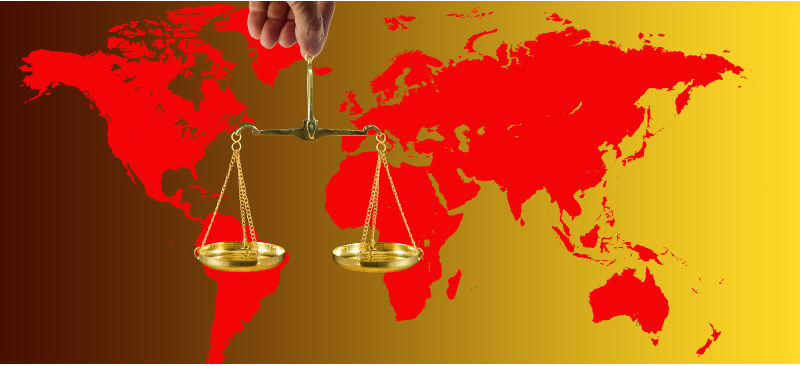Why we must never stop exposing cant and hypocrisy
June 3, 2024
To witness repeated atrocities around the world is hard enough. To observe wilful slaughter, when it’s openly supported by nations claiming adherence to human rights and international law, is nauseating. The killing of dozens of Palestinians in a supposed safe zone in Rafah is just the latest bloody outrage on global view.
Despite almost universal condemnation, the pattern of death and destruction was set well before 7 October, as Stuart Rees has argued in a recent P&I article. But the reverberations over the Rafah bloodbath, like on so many other occasions, will soon fade, obscured by claims it was a terrible mistake and by official inquiries.
Israel’s ‘red line’ backers have a long murderous track record of their own. They may claim to be decent, peace-loving nations, but over many decades they have mounted illegal invasions, occupations, and covert operations, and backed death squads and military coups. The secrets, lies and distortions used to justify such violent incursions have been as florid as they are morally reprehensible. Historically, as Yanis Varoufakis points out, European powers along with the United States have assailed and destabilised many parts of the world, all in the name of freedom, justice and democracy. Varoufakis attributes the current debacle in the Middle East to decisions made over a century ago in Britain, aided and abetted by European nations and the US.
But at what cost? Melbourne-based scholar Gideon Polya has, over many years, sought to catalogue the human costs of all this in terms of the number of avoidable deaths resulting from various military ‘interventions’. According to his analysis (based on myriad sources), the figures run into the tens of millions. And that’s just the body count. Many people also die of their injuries – a rolling death toll. Polya’s amassed data also points to enumerable environmental harms and damage done to economies, infrastructure, health and education systems – all of which, sooner or later, further increase the death tally.
Most people living in the nations responsible for such carnage have little or no idea of these grotesque consequences. As in the cases of Iraq, Libya and Afghanistan, after the initial onslaught, the mainstream media soon loses interest and moves on to more parochial concerns. In 2010, a book I co-authored with American journalist Mike Otterman, Erasing Iraq, won an award for the best unread non-fiction book of the year! It catalogued the terrible aftermath of the 2003 invasion and subsequent occupation by the self-styled Coalition of the Willing. By 2010, few media outlets were interested in Iraq, and the public had tired of such coverage. A blind eye was turned to the massive ongoing trauma inflicted on Iraq which to this day remains in a state of turmoil.
This is a sickeningly repetitive tale of how supposedly decent, peace-loving nations inflict pain and suffering while washing their hands of all moral responsibility when things go horribly wrong, as they invariably do.
Despite growing global anger at the complicity and sheer cowardice of western nations when it comes to the murderous military excesses of Israel, little will be done to stop it, not even following the UN calls for a ceasefire and judgements by the ICJ and ICC. Weapons are still exported to Israel by western powers (including vital parts from Australia). Notwithstanding the evident slaughter of innocents, ‘unwavering’ or semi-qualified support is granted to a nation supposedly trying to ‘defend’ itself. Counter political voices are occasionally raised, as in the case of senators Fatima Payman and David Shoebridge , but these are quickly quashed by cheap accusations of antisemitism.
The same applies when observations are made that Israel uses the cover of significant events in the US and elsewhere to distract from its most brutal assaults on Palestinians. As US Palestinian law student Ahmad Isais points out, distractions occur as a matter of routine in the US. Writing during one of the peaks of the Gaza slaughter, Isais notes: “…if you were to turn on the news we are bombarded with coverage of the Met Gala and other inanities. The media, and western world at large, fawns over the costumes draped over an evening of celebrity gossip, with no mention of the 200 Palestinians murdered every day.”
Despite such depressing realities, the global encampment movement reminds us of the political heart that still beats among young people who see in their governments the betrayal of human decency, compassion and kindness. They witness too the chasm between what ‘decent’ nations profess – adherence to a rule-based order and human rights – and the genocidal murder to which many are party.
At this point, no-one knows what will become of the Palestinian people, other than continued slaughter, pain and suffering to which they have been subjected for over seven decades. Journalists, academics, artists, writers and all humanitarian citizens have a responsibility to keep exposing the cant and hypocrisy of the powerful and to demand accountability and justice for Palestinian and other beleaguered peoples. We can achieve peace with justice.

